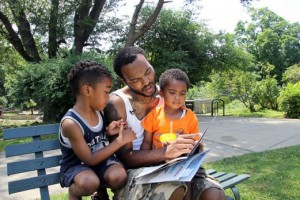Monday night’s School Reform Commission meeting on strategy, policy, and priorities brought together teachers, partner organizations, and District officials working on a new citywide campaign. They were all looking for answers to the same question: How do we get kids to read?
The common answer that night: Parents need to be involved, preferably from their children’s early stages of development. Parents at the meeting, however, represented a small minority of attendees.
The campaign, called READ! by 4th, stands for Ready, Engaged, Able, and Determined, and aims for reading proficiency for all Philadelphia 4th graders by 2020. The program launched in August.
Superintendent William Hite talked at the meeting about the importance of early literacy in children for future success.
“One thing we know [is] that all of the factors around literacy point to the fact that if we can address early literacy by the time children are in 3rd or 4th grade, it’s a resolution to everything we will face later,” he said in his opening remarks.
Monday’s SRC meeting included panel presentations, table discussions with a moderator, and a summary of every table’s thoughts and ideas to the larger group. About 100 attendees discussed questions about early literacy and involvement from READ! by 4th partners on strategies and best ways to support families and children.
When roundtable discussions were shared with the group, the common theme expressed was that parent involvement in reading with their children at an early age is imperative. However, attendees agreed that bringing that information to parents directly, in their own community, needed to be the first step.
“We wanted to make sure that parents really have a true understanding of what’s at stake. That’s the real bottom line,” one table facilitator said to the room. “Do the parents really understand what the impact of READ! by 4th really is? And so we have to really figure out the most effective way to convey that to parents.”
One table called the alignment between parents and organizations “puzzle pieces,” questioning what needs to be done so they can fit together. Another called for stronger connections where organizations learn the needs of families, the District aids partner organizations with community updates and initiatives, and school principals and teachers work together to get what they need.
Amy Pace, a Temple University post-doctoral fellow, spoke about a study in which she placed large signs within the fruit and vegetable sections of grocery stores that encouraged parents to talk to their children and ask open-ended questions to facilitate a healthy conversation.
She explained that her other studies have found that good communication with parents and their children at an early age is a good predictor of the child’s language skills later in life. Over time, the quality of early interactions, like what the grocery stores signs are meant to encourage, were important for communication growth.
“If we can help parents engage in what we’re calling ‘conversational duets,’ we can improve language and literacy outcomes,” Pace said. “It does not matter what language they’re speaking or learning a language or two or more, it cannot be a solo performance. It has to go back and forth to continue the conversation.”
During the short Q&A section of the meeting, one woman asked Pace how much the materials for the supermarket campaign had cost. The reply: “About 60 bucks.” The audience laughed and nodded in approval. One person said, “We can do that.”
Conversations for the final roundtable discussions centered on strategies that could be used to improve literacy. Many tables responded positively to the idea of “going back to the basics” and trying to get messaging out to parents at home and in their communities.
“If children start behind, they are likely to stay behind,” said Diane Castelbuono, deputy chief of the District’s Office of Early Childhood Education. She also emphasized that teaching a child to read is a very individualized process and that teachers need to be given materials that are easy to use and reflect the child’s identity.
A core component to READ! by 4th includes increasing access to high-quality pre-K, and she said she expects access around the city to improve with the addition of over 200 seats by the end of the school year.
It was also announced at the meeting that the Free Library of Philadelphia was selected as the anchor organization for the READ! by 4th campaign.
“One thing that went unsaid tonight is the scale of the crisis that we’re confronting as a city and a country,” said Deputy Superintendent Paul Kihn in his closing remarks. “It will really take all of us working together in a coordinated and collected way … in order to make progress in this regard.”
